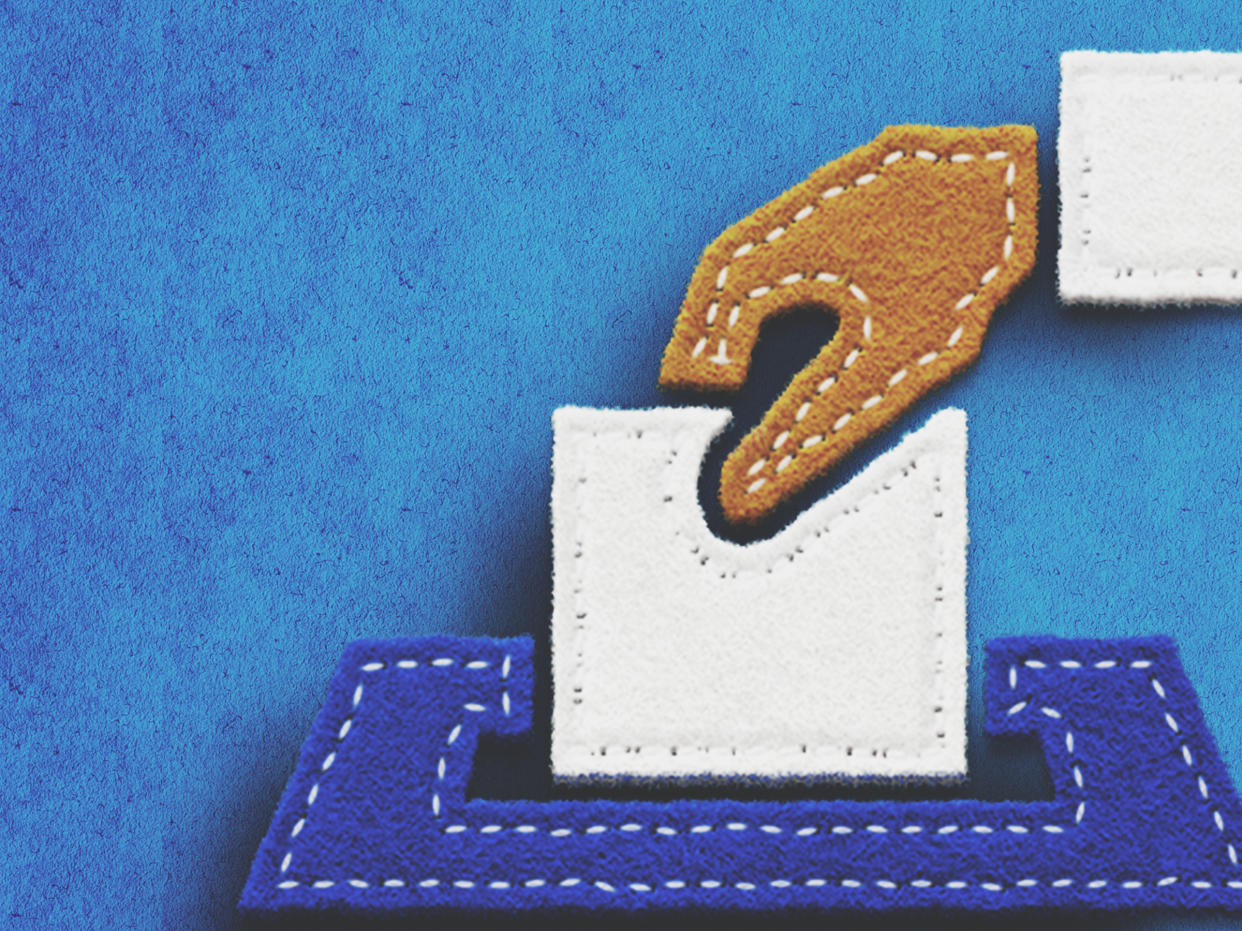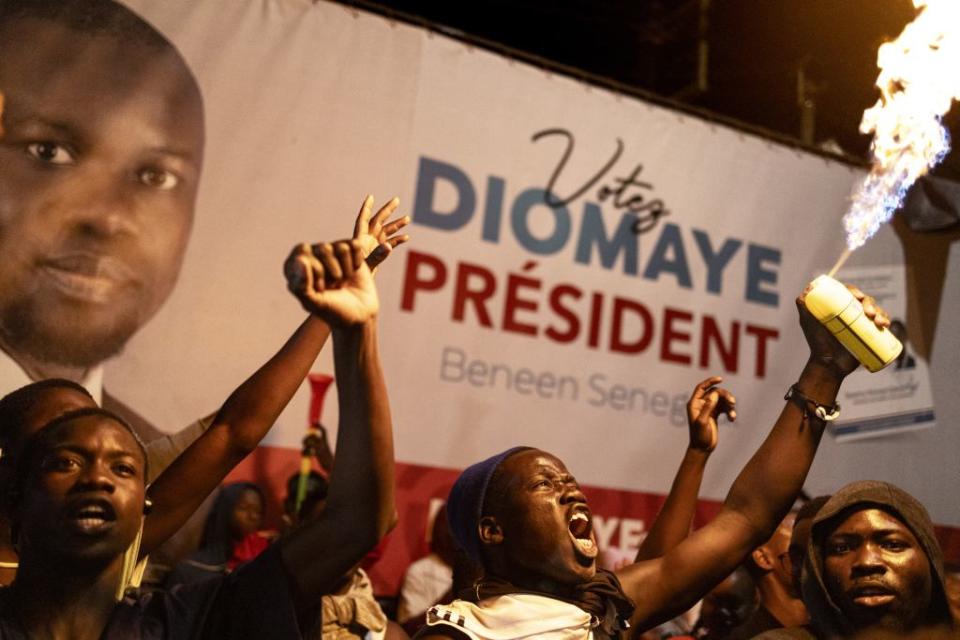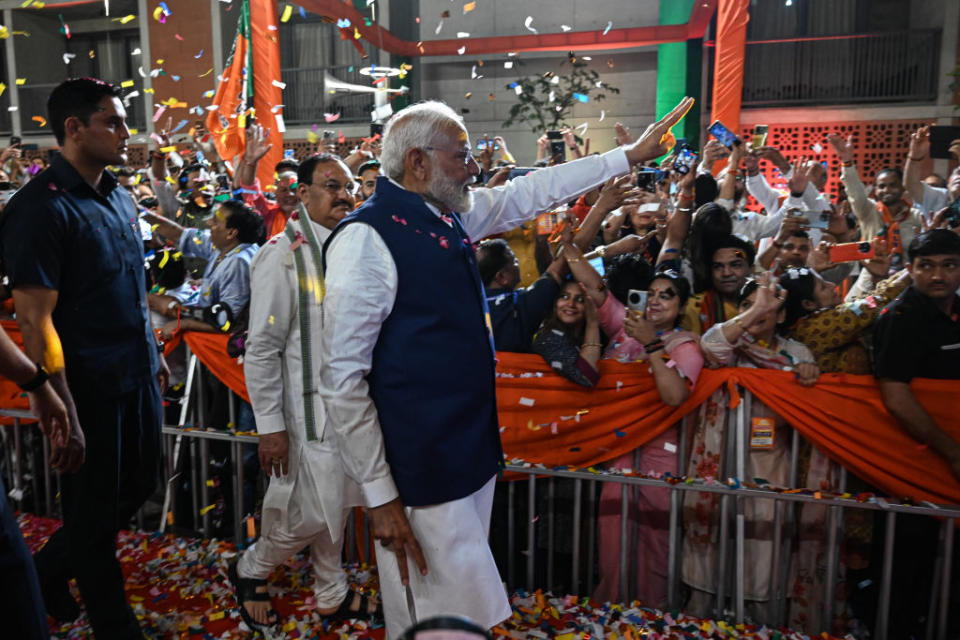2024 Elections Around the World: Results

Credit - Getty Images
More than one billion people around the world have already voted in 2024—and there are many elections still to go in this history-making year.
Polls for national office have been—or will be—held in more than 60 countries (as well as the European Union), home to nearly half the people on earth.
[Click here for a previous version of this story that outlines 2024 elections by population and includes a “freedom and fairness score” for each country.]
And so far, a tsunami of change is sweeping ballot boxes worldwide.
But the tides are turning in different directions: elections in Europe have seen far-right parties make serious gains; meanwhile, South Korea’s main liberal opposition to the ruling conservative government earned a landslide victory in parliamentary elections, and Senegal’s delayed presidential vote was hailed by observers as a win for democracy after it elevated a relative outsider and anti-corruption candidate, bringing a surprise end to the decades-long domination of the country’s ruling coalition.
What’s clear is that people don’t want things to stay the same. Even in places where incumbent governments have retained power, they’ve done so with significantly less public support than before. In India, Prime Minister Narendra Modi was forced to form a coalition after his Bharatiya Janata Party failed to secure an outright majority in parliament for the first time in a decade. South Africa’s African National Congress also formed a coalition after losing its parliamentary majority for the first time since the end of apartheid. And in countries where meaningful opposition has been curbed by ruling elites, such as Russia or Bangladesh, many have opted to spoil their votes or boycott the polls as a form of protest.
Yet more changes look to be on the horizon: the U.K.’s conservative Tories are facing almost certain heavy defeat after 14 years in power; French President Emmanuel Macron’s moderate alliance is faltering under challenges from an insurgent far-left and far-right; and the world is bracing for the potential tumultuous comeback of former U.S. President Donald Trump.
Researchers say this widespread yearning for something different—in the various forms it can take—largely stems from a sense of hopelessness, whether about dim economic prospects, climate change, disinformation, or even the state of democracy.
Read More: The Dread Election
“Hopelessness is a very powerful feeling in electoral psychology, because it’s the feeling that people have when they think that things are so bad, that it can’t really get worse anyway,” Michael Bruter, the director of the Electoral Psychology Observatory at the London School of Economics and Political Science, tells TIME. “And when they think that, it’s very disinhibiting because people then feel that, in a way, they might decide to vote for political parties which they do not believe [are] the solutions just because they feel that the situation is so desperate that they want change at any cost.”
“Change becomes a value in its own right,” he adds, saying that for many this sentiment isn’t partisan or ideological and might reflect a deeper dissatisfaction with political institutions and systems. “It’s about almost resenting the very way in which democracy works and gives some people the power to govern us.”
2024 has been described as a “make-or-break year for democracy,” as the sheer number of elections—and what they reflect or fail to reflect about the will of various peoples—could significantly shape the course of the world’s future.
“Democracy around the world has been on decline in recent years, and the institution is still in a precarious position,” Samuel Woolley, the project director for propaganda research at the University of Texas at Austin’s Center for Media Engagement, tells TIME. This year will serve as a large-scale test to an institution already strained by growing trends of authoritarianism and political extremism, and upcoming elections in leading democracies like the U.K. and the U.S., in particular, Woolley says, will serve as “a bellwether of what is to come for the state of global governance.”
Below are all the national elections around the world this year, with results through June, in chronological order.
(Not included in this list are indirect elections, such as Cambodia Senate, Democratic Republic of the Congo Senate, Nepal National Assembly, and Thailand Senate; places not recognized as countries by the U.N. other than Taiwan, such as Montserrat, Sint Maarten, Somaliland, and South Ossetia; and elections that have been postponed or canceled and are no longer expected in 2024, such as Burkina Faso, Guinea, Mali, North Korea, and Ukraine.)
JANUARY
Bangladesh
Type: Legislative
Date: Jan. 7
What to Know: Prime Minister Sheikh Hasina secured a fourth term as her party the Awami League, along with its allies, won 225 out of 300 National Parliament seats in a largely uncontested election after the main opposition Bangladesh Nationalist Party boycotted the polls to protest Hasina’s crackdown on political dissent.
Read More: Sheikh Hasina and the Future of Democracy in Bangladesh
Bhutan
Type: Legislative
Date: Jan. 9 (second round; first round on Nov. 30, 2023)
What to Know: Economic frustrations in the landlocked kingdom of less than one million people thrust former Prime Minister Tshering Tobgay, who led from 2013 to 2018, back into power after his People’s Democratic Party won a majority of seats in the National Assembly in a rebuke to the previous government.
Read More: Bhutan Opposition Party Wins Elections Amid Economic Threats to ‘Gross National Happiness’
Taiwan
Type: Presidential and Legislative
Date: Jan. 13
What to Know: In Taiwan’s much-watched election—largely due to the global implications of China’s increasing assertion of control over the self-ruled island—the Beijing-skeptical Democratic Progressive Party maintained the presidency with the victory of former Vice President Lai Ching-te, but it lost its majority in the Legislative Yuan to the Beijing-friendly Nationalist Party, or Kuomintang, which has already set out to constrain Lai’s government.
Read More: Taiwan’s Election Isn’t a Disaster for Xi Jinping—Unless He Makes It One

Comoros
Type: Presidential
Date: Jan. 14
What to Know: Comoros President Azali Assoumani, who came to power in a 1999 military coup, was reelected to a fourth term in an election that saw low voter turnout amid an opposition boycott. After the result, the army quelled street protests as Assoumani’s opponents alleged voter fraud.
Tuvalu
Type: Legislative
Date: Jan. 26
What to Know: In the absence of formal political parties in the small Pacific island nation, all candidates for 16 parliamentary seats are independent, and the winners later select the Prime Minister. After the country’s former leader Kausea Natano, who was an outspoken supporter of Tuvalu’s diplomatic relationship with Taipei over Beijing, lost his seat, former Attorney General Feleti Teo was named Prime Minister—though his new government has reaffirmed Tuvalu’s Taiwan ties.
FEBRUARY
El Salvador
Type: Presidential and Legislative
Date: Feb. 4
What to Know: President Nayib Bukele, the self-described “world’s coolest dictator” whose hardline crackdown has been credited with bringing down the country’s crime rate, was reelected with nearly 85% of the vote, while his New Ideas Party won a legislative supermajority, signaling massive public support for Bukele’s governance project despite accusations of democratic backsliding.

Azerbaijan
Type: Presidential
Date: Feb. 7
What to Know: President Ilham Aliyev, who has ruled the country since 2003, secured a fifth consecutive term after winning 92% of the vote, in an election that observers described as “devoid of genuine pluralism.” Aliyev called a snap election amid a popularity surge after Azerbaijani troops defeated separatists in the disputed Nagorno-Karabakh region last September.
Pakistan
Type: Legislative
Date: Feb. 8
What to Know: Despite Pakistan’s powerful military “brazenly” rigging the contest against jailed former Prime Minister Imran Khan and his Pakistan Tehreek-e-Insaf (PTI) party, PTI-backed candidates won a plurality of parliamentary seats on an Election Day marred by violence and irregularities—and allegations of voter fraud. Still, a military-backed coalition headed by former Prime Minister Shehbaz Sharif ultimately took power.
Read More: Pakistan’s Military Used Every Trick to Sideline Imran Khan—and Failed. Now What?
Finland
Type: Presidential
Date: Feb. 11 (runoff; first round on Jan. 28)
What to Know: Centrist former Prime Minister Alexander Stubb won 51.6% of the votes in a close runoff against independent liberal candidate Pekka Haavisto, who vied unsuccessfully for the third time to become Finland’s first gay President. The campaign to become head of state, a role that takes the lead on defense and foreign policy, was dominated by issues of internationalism and national security, particularly relations with neighbor Russia. Stubb, known for his love for the spotlight, is strongly pro-Europe and a vocal supporter of cooperation with NATO, which the country joined last year in response to the war in Ukraine.
Indonesia
Type: Presidential and Legislative
Date: Feb. 14
What to Know: Prabowo Subianto, the 72-year-old former general who was once condemned by the U.S. for alleged human rights abuses, won the Indonesian presidency after being tacitly endorsed by outgoing popular President Joko Widodo (colloquially known as Jokowi) and selecting Jokowi’s son as his running mate. Prabowo largely ran on a continuity platform, pledging to continue to prioritize economic development and to maintain the country’s relative neutrality on the world stage, while also campaigning on a populist nationwide free school lunch program.
Read More: What to Know About Prabowo Subianto as Uncertainty Looms for Indonesia’s Democracy

Belarus
Type: Legislative
Date: Feb. 25
What to Know: Russian President Vladimir Putin congratulated President Alexander Lukashenko for solidifying his rule of Belarus, after the Russia ally held its first election—described as a “sham” by the U.S.—following nationwide protests against Lukashenko’s decadeslong regime in 2020. Lukashenko said he’d “learned his lesson” from the protests and that there would be “no rebellions” during the 2024 parliamentary vote, in which only candidates loyal to Lukashenko were permitted to compete and the opposition called for a boycott of the polls.
MARCH
Portugal
Type: Legislative
Date: Mar. 10
What to Know: In snap legislative elections called early after the resignation last year of the center-left Socialist Party Prime Minister António Costa, the center-right Democratic Alliance, led by Luís Montenegro of the Social Democratic Party, won a slim plurality in the country’s closest-ever parliamentary polls, which saw the rise of the far-right Chega party. The Democratic Alliance formed a minority government that left out Chega, whose insurgency threatens to disrupt the long two-party dominance of the Socialists and Social Democrats that have taken turns in power since Portugal’s revolution in 1974.
Read More: How Europe’s Far-Right Parties Are Winning Over Young Voters
Russia
Type: Presidential
Date: Mar. 15–17
What to Know: Russian President Vladimir Putin secured a six-year fifth term after winning nearly 90% of the vote in an election that had no viable opposition and was widely considered rigged, setting him on track to become the country’s longest serving President in two centuries.
Read More: Navalny Challenges Putin from Beyond the Grave
Senegal
Type: Presidential
Date: Mar. 24
What to Know: After a controversially-delayed vote, Bassirou Diomaye Faye—who was supported by popular opposition leader Ousmane Sonko, who Faye went on to appoint Prime Minister— won 54% of the vote, over 18% more than the second-place candidate Amadou Ba, outgoing President Macky Sall’s preferred successor. Faye and Sonko’s success, just days after their release from prison, marks a sharp break from the decades-old ruling coalition United in Hope and has been hailed by observers as a democratic success.

APRIL
Kuwait
Type: Legislative
Date: April 4
What to Know: Opposition candidates maintained a majority in Kuwait’s National Assembly, which appeared set to remain in deadlock with the country’s royal-appointed cabinet until Emir Sheikh Mishal al-Ahmad al-Sabah, who became the monarch last year, dissolved the parliament in May before it even met, and he suspended parliamentary government for up to four years—a drastic consolidation of power that Kuwait’s ruling family has only done twice before since the country’s independence in 1961. A number of former opposition parliamentarians have since been arrested and charged with challenging or insulting the authority of the Emir, who recently named his crown prince (a nomination that previously would have required parliamentary approval).
Slovakia
Type: Presidential
Date: April 6 (runoff; first round on Mar. 23)
What to Know: Peter Pellegrini, a longtime ally of pro-Russian Prime Minister Robert Fico, was elected President, a largely honorary yet influential role in Slovakia’s government, cementing Fico’s influence and rebuking the pro-Western opposition as well as the outgoing liberal presidency of Zuzana Čaputová, which Pellegrini described as an “opposition, opportunistic power center.”
South Korea
Type: Legislative
Date: April 10
What to Know: Amid an alleged corruption scandal and dismal approval ratings, President Yoon Suk-yeol’s conservative People Power Party, suffered a landslide defeat to opposition parties, exacerbating stalemate in parliament as the country faces record-high suicides, record-low births, and increasing threats from North Korea.
Croatia
Type: Legislative
Date: April 17
What to Know: The pro-Ukraine, pro-West ruling center-right Croatian Democratic Union (HDZ), which has been marred by corruption scandals and criticisms of growing illiberalism in recent years, won a plurality of seats and formed a coalition government with the third-place far-right nationalist Homeland Movement. HDZ leader Andrej Plenković secured a third term as Prime Minister, beating back a challenge by the pro-Russia, mostly-ceremonial President Zoran Milanović, whose euroskeptic Social Democratic Party placed second.
Solomon Islands
Type: Legislative
Date: April 17
What to Know: The ruling Ownership, Unity and Responsibility (OUR) party, led by four-time Prime Minister Manasseh Sogavare, performed well below expectations. After Sogavare stepped down as leader of the party, which still won a plurality of 15 seats in the 50-member parliament, new OUR leader former foreign minister Jeremiah Manele was elected Prime Minister by a secret ballot among fellow legislators. Manele is expected to continue pursuing closer relations with China as Washington and Beijing compete for influence in the Pacific.
India
Type: Legislative
Date: April 19 – June 1
What to Know: After a campaign defined by rampant disinformation, Narendra Modi secured a third term as Prime Minister, though his Bharatiya Janata Party (BJP), which has overseen a divisive Hindu nationalist movement, lost its outright majority in the Lok Sabha for the first time in a decade. Observers say the result likely stems from voters’ economic frustrations and that it may temper the BJP’s domestic policy ambitions while having a smaller impact on Modi’s foreign policy assertiveness.
Read More: What Modi 3.0 Means for the World

Maldives
Type: Legislative
Date: April 21
What to Know: President Mohamed Muizzu’s People’s National Congress party won a shock landslide victory, cementing his power and affirming his efforts to tilt the archipelagic nation toward China and away from its traditional ally India, which recently began a tourist boycott of the popular vacation destination.
Togo
Type: Legislative
Date: April 29
What to Know: Togo’s parliamentary polls were overshadowed by controversial constitutional reform passed just before the election and signed just after by President Faure Gnassingbé, who has led the country since the 2005 death of his father, who ruled for 38 years, making them the longest-lasting dynasty in Africa. The reform eliminates direct presidential elections, allowing the parliament—of which Gnassingbe’s ruling party just won 108 of 113 seats amid a crackdown on civic and media freedoms—to choose a ceremonial President who then appoints what is effectively a prime minister. It’s seen as a way for Gnassingbé to skirt his upcoming presidential term limits, which he’d already extended, and continue ruling indefinitely.
MAY
Panama
Type: Presidential and Legislative
Date: May 5
What to Know: Amid widespread discontent about the economy and corruption, Panama’s ruling and largest party the center-left Democratic Revolutionary Party, led by incumbent Vice President José Gabriel Carrizo, suffered massive electoral defeat in the presidential and parliamentary elections, while the right-wing Realizing Goals party won a plurality in both. José Raúl Mulino, who was initially the Realizing Goals running mate of former President Ricardo Martinelli, ended up topping the ticket and was elected President after Martinelli was convicted of money laundering and subsequently disqualified.
Chad
Type: Presidential
Date: May 6
What to Know: In the first presidential election since Mahamat Idriss Déby seized power in 2021 as interim leader after his father President Idriss Déby was killed by rebels, Déby won 61% of the vote to extend his rule—though international observers cast doubt on the election’s credibility.
North Macedonia
Type: Presidential and Legislative
Date: May 8 (presidential runoff; first round on April 24)
What to Know: Gordana Siljanovska-Davkova, of the nationalist VMRO-DPMNE party, defeated incumbent center-left President Stevo Pendarovski to become the country’s first female President. Meanwhile, VMRO-DPMNE won a plurality of 55 out of 120 parliamentary seats, fueled by voters’ anger at the country’s slow integration into the E.U., and formed a coalition government that’s expected to continue the former ruling coalition’s support of Ukraine against Russia’s invasion.

Iran
Type: Legislative
Date: May 10 (second round; first round on Mar. 1)
What to Know: Conservative candidates won most of the seats in the Islamic Consultative Assembly, Iran’s parliament, as well as the Assembly of Experts, a body of religious scholars who select the country’s Supreme Leader—though the election had the lowest turnout since the country’s 1979 revolution as activists, including Nobel Peace Prize laureate Narges Mohammadi, called for a boycott.
Dominican Republic
Type: Presidential and Legislative
Date: May 19
What to Know: Domestically popular President Luis Abinader easily won a second term, as voters signaled their approval of his handling of the economy and tough stance on strife-torn neighbor Haiti, while his Modern Revolutionary Party grew its majorities in both houses of Congress.
Lithuania
Type: Presidential
Date: May 26 (runoff; first round on May 12)
What to Know: President Gitanas Nausėda was reelected to a second term with more than 74% of the vote, the highest support a presidential candidate has received since Lithuania’s independence in 1990, as voters—amid concerns about Russia’s invasion Ukraine—entrusted the incumbent over Prime Minister Ingrida Šimonytė for a role that oversees defense and foreign policy.
Madagascar
Type: Legislative
Date: May 29
What to Know: According to provisional results by the National Electoral Commission, the ruling coalition led by President Andry Rajoelina’s center-left party narrowly lost its majority, winning 80 of 163 seats in the National Assembly. But according to official results released in late June by the High Constitutional Court, the coalition retained its majority with 84 seats, amid allegations of voter fraud and a crackdown on the political opposition.
South Africa
Type: Legislative
Date: May 29
What to Know: The African National Congress, which has ruled South Africa since its first democratic elections in 1994 when Nelson Mandela became President, lost its majority in parliament for the first time. ANC leader Cyril Ramaphosa was elected by the National Assembly to a second term as President after forming an uneasy coalition with white-led rival party the Democratic Alliance to create what they dubbed a “national unity” government, though it’s already been wracked by divisions.
JUNE
Iceland
Type: Presidential
Date: June 1
What to Know: Halla Tómasdóttir, a businesswoman who said she would “rise above all party politics,” was elected to the largely ceremonial presidency after winning a plurality of 34% of the vote—beating a dozen competitors, including former Prime Minister Katrín Jakobsdóttir, who was viewed as too political, and arctic and energy scholar Halla Hrund Logadóttir.
Mexico
Type: Presidential and Legislative
Date: June 2
What to Know: Claudia Sheinbaum of the populist left-wing Morena party, who positioned herself as a continuation of outgoing President Andrés Manuel López Obrador, won by a landslide to become the country’s first female President. Morena and its allies also dominated in the legislative elections, winning a two-thirds supermajority in the Chamber of Deputies (the lower house), and falling just short of the same in the Senate—setting the stage for Sheinbaum to try to implement sweeping reforms and address nationwide concerns like organized crime and gender-based violence.
Read More: The Meaning of Mexico’s First Female President

European Union Parliament
Date: June 6–9
What to Know: The conservative European People’s Party won 190 out of 720 seats—the most of any party—signifying a rightward lurch for the E.U.’s lawmaking body, though incumbent European Commission President Ursula von der Leyen, a centrist, maintains a narrow path to another term via a liberal coalition.
Read More: This 28-Year-Old Is the New Face of Europe’s Far Right
Belgium
Type: Legislative
Date: June 9
What to Know: The conservative New Flemish Alliance retained its position as the biggest party in parliament after winning 25.6% of the vote, while the far-right Vlaams Belang party took 21.8%. Prime Minister Alexander De Croo tendered his resignation after a poor showing by his liberal Open VLD party, though he remains the caretaker leader until coalition talks are completed.
Bulgaria
Type: Legislative
Date: June 9
What to Know: The election—the country’s sixth in just three years, prompted by the collapse of the ruling coalition led by the conservative GERB party and the reformist We Continue the Change party—comes in the wake of massive anti-corruption protests and a series of failed coalition governments. GERB won a plurality of 68 out of 240 seats in a fragmented parliament, but political instability looks set to continue: under a new power-sharing deal similar to the previous one that failed, We Continue the Change’s Nikolay Denkov will be Prime Minister for nine months before handing over the premiership to GERB’s Maria Gabriel.
San Marino
Type: Legislative
Date: June 9
What to Know: About 19,000 people in the European microstate of 34,000, where access to the E.U.’s single market is the predominant political issue, turned up to vote for a new Grand and General Council—which later chooses the country’s key executive leaders. The election was competed mainly between a coalition of pro-European parties (Libera, the Socialist Party, and the Party of Socialists and Democrats), and a rival, more euroskeptic coalition led by the largest party the center-right Sammarinese Christian Democratic Party and the newly-formed Reformist Alliance. The latter ended up winning a plurality of 26 of 60 parliamentary seats, besting the other coalition by 8 seats, and is expected to form the government and pursue fiscal reform.
Mongolia
Type: Legislative
Date: June 28
What to Know: Amid frustrations about the economy and corruption and after a constitutional amendment increased the number of seats in the State Great Khural, the center-left ruling Mongolian People’s Party led by Prime Minister Luvsannamsrain Oyun-Erdene lost its supermajority but narrowly retained a parliamentary majority—winning 68 of 126 seats, according to preliminary results, while observers say the strong turnout (nearly 70%) and gains made by the opposition suggests “desire for some change.”
Mauritania
Type: Presidential
Date: June 29
What to Know: According to provisional results, President Mohamed Ould Ghazouani, whose Equity Party has dominated parliament for years and who is viewed by many as bringing stability to the country despite high levels of poverty, was reelected to a second term with 56% of the vote—though his opponent, activist Biram Dah Abeid who received 22% of the vote, rejected the results, citing irregularities.
JULY
United Kingdom
Type: Legislative
Date: July 4
Read More: The Man Who Wants to Fix Britain
Iran
Type: Presidential
Date: July 5 (runoff; first round on June 28)
Read More: How the Mahsa Amini Protests Loom Over Iran’s Presidential Election
France
Type: Legislative
Date: July 7 (second round; first round on June 30)
Read More: Macron Called an Election to Thwart the Far Right. He Resuscitated the Left Instead

Rwanda
Type: Presidential and Legislative
Date: July 15
Syria
Type: Legislative
Date: July 15
Venezuela
Type: Presidential
Date: July 28
SEPTEMBER
Algeria
Type: Presidential
Date: Sept. 7
Jordan
Type: Legislative
Date: Sept. 10
Romania
Type: Presidential
Date: Sept. 15 (potential runoff on Sept. 29)
Sri Lanka
Type: Presidential
Date: Between Sept. 17 and Oct. 16
Czechia
Type: Legislative
Date: Sept. 20–21
Austria
Type: Legislative
Date: Sept. 29
OCTOBER
Mozambique
Type: Presidential and Legislative
Date: Oct. 9
Lithuania
Type: Legislative
Date: Oct. 13
Moldova
Type: Presidential
Date: Oct. 20
Georgia
Type: Legislative
Date: Oct. 26
Uruguay
Type: Presidential and Legislative
Date: Oct. 27
Botswana
Type: Legislative
Date: To Be Decided (TBD)
NOVEMBER
Palau
Type: Presidential and Legislative
Date: Nov. 5
United States
Type: Presidential and Legislative
Date: Nov. 5
Read More: Donald Trump on What His Second Term Would Look Like

Namibia
Type: Presidential and Legislative
Date: Nov. 27
DECEMBER
Ghana
Type: Presidential and Legislative
Date: Dec. 7
Romania
Type: Legislative
Date: Dec. 8
Croatia
Type: Presidential
Date: TBD
South Sudan
Type: Presidential
Date: TBD
Read More: The World’s Newest Nation Is Unraveling
TBD
Guinea Bissau
Type: Presidential and Legislative
Kiribati
Type: Presidential and Legislative
Mauritius
Type: Legislative
Tunisia
Type: Presidential
Uzbekistan
Type: Legislative
Contact us at letters@time.com.


